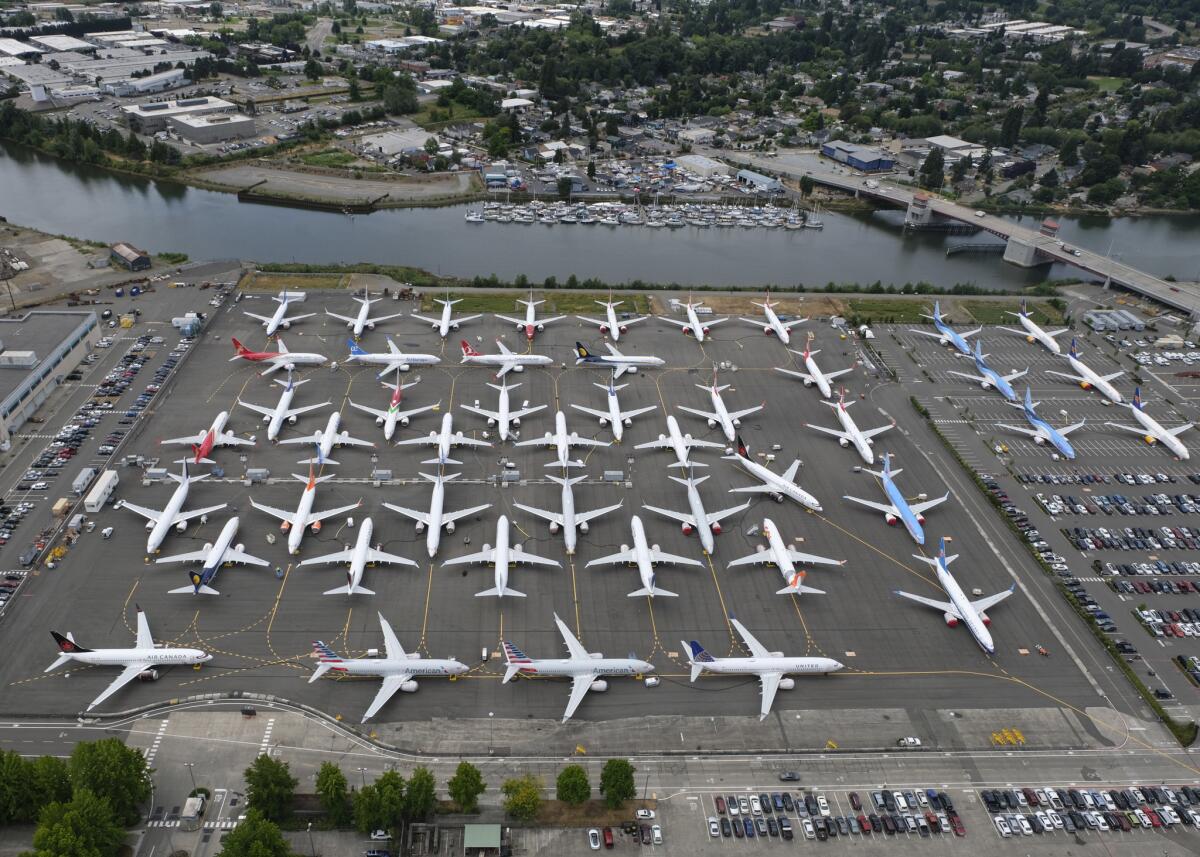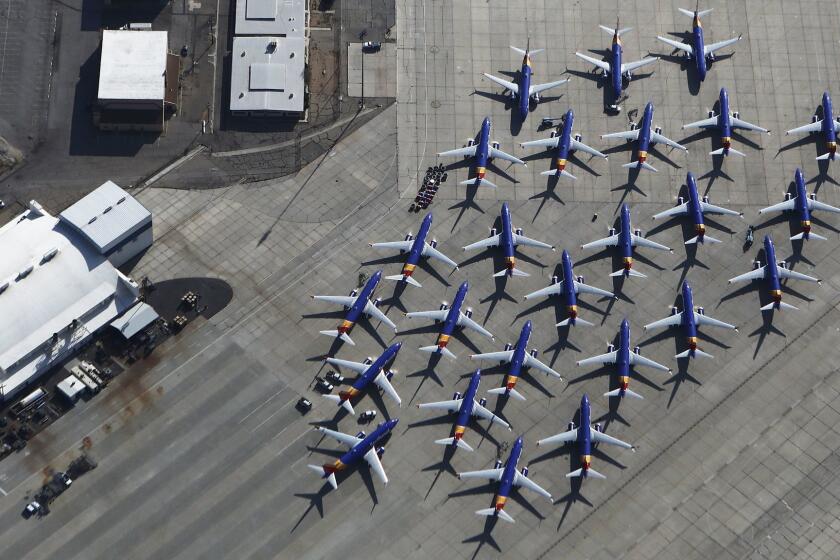Boeing’s jetliner division chief steps down amid 737 Max crisis

- Share via
Boeing Co. said Kevin McAllister is stepping down as head of its jetliner division, after less than three years in the role, amid a crisis engulfing the 737 Max and production snarls with other planes.
Stan Deal, the head of Boeing’s global services business, will replace McAllister, the company said in a statement Tuesday. McAllister is the first to depart from Boeing’s upper echelons since two deadly 737 Max crashes killed everyone aboard the two planes and prompted a worldwide grounding of the jet.
McAllister’s exit marks the second jolt to Boeing’s management this month: Chief Executive Dennis A. Muilenburg was stripped of his chairman role Oct. 11. The ban on flying the 737 Max has cost Boeing more than $8 billion, and the plane isn’t expected to carry any passengers until next year. Meanwhile, the company is due to report financial results Wednesday, and Muilenburg is slated to testify before Congress next week.
“The drumbeat for major executive changes is only getting louder,” said Richard Aboulafia, an aerospace analyst at Teal Group. As for McAllister’s ouster, “I’m not sure what it accomplishes, but at least Stan Deal is a really great choice.”
Boeing shares climbed 1.8% on Tuesday. They have tumbled 20% — the worst performance in the Dow Jones industrial average — since the second deadly plane crash, which took place March 10.
With Deal, Boeing is tapping an executive with deep sales and supplier-management experience to lead the company’s largest business. He will be replaced at Boeing’s services division by Ted Colbert. Vishwa Uddanwadiker was named Boeing’s interim chief information officer, replacing Colbert.
The leadership overhaul followed a board meeting Monday in San Antonio. The gathering was excruciating, according to a person familiar with the discussions, because of the pressure on directors and the drubbing Boeing was taking on Wall Street.
As the first outsider to run Boeing’s main business, McAllister faced a steep learning curve when he joined the company from General Electric Co. in late 2016. The challenge deepened immeasurably when two newly built Max planes crashed within a five-month span — one in Indonesia in October 2018 and one in Ethiopia this March — killing 346 people.
Regulators grounded the jet after the second fatal accident, turning Boeing’s largest source of revenue into a cash drain. Multiple investigations into the design and certification of the jet are underway, and Boeing’s reputation for safety has been battered.
Warm and self-effacing in person, McAllister had a lower public profile than his predecessor, Ray Conner, a former chief salesman known for his white-glove treatment of key clients.
Although the 737 Max was largely designed and certified on Conner’s watch, McAllister drew criticism for not paying enough attention to some customers after the accidents. He retreated further from the spotlight as Muilenburg became the public face of the company during the crisis.
Boeing has known about the 737 Max messages for months but alerted safety regulators only this week, the Federal Aviation Administration said.
The commercial-airplane unit had other stumbles under McAllister. While the division notched strong sales, the 737 assembly line struggled with a shortage of engines and other parts last year. The KC-46 tanker and 787 Dreamliner programs were marred by tools and debris left within completed frames.
The jetliner division generates about 60% of Boeing’s sales. Its product lineup spans the bestselling 737, which was first designed in the 1960s, to the Dreamliner’s advanced technology.
Deal, who holds an aerospace engineering degree from the University of Illinois, joined Boeing through the merger with McDonnell Douglas Corp. in 1997. He worked his way from the MD-11 Japan Airlines program to a variety of leadership roles in sales and marketing for Boeing’s jetliner division.
He worked closely with Conner as senior vice president of commercial aviation services, later ascending to the company’s executive counsel when Muilenburg created a global services division in 2017.
More recently, Deal kept a hand in airplane manufacturing even when running the new services business, which is focused on spare parts and maintenance. The company’s new forays into vertical integration, such as joint ventures to make deluxe airplane seats and auxiliary power units — the mini engines in a jet’s tail — reported to Deal.
More to Read
Inside the business of entertainment
The Wide Shot brings you news, analysis and insights on everything from streaming wars to production — and what it all means for the future.
You may occasionally receive promotional content from the Los Angeles Times.









